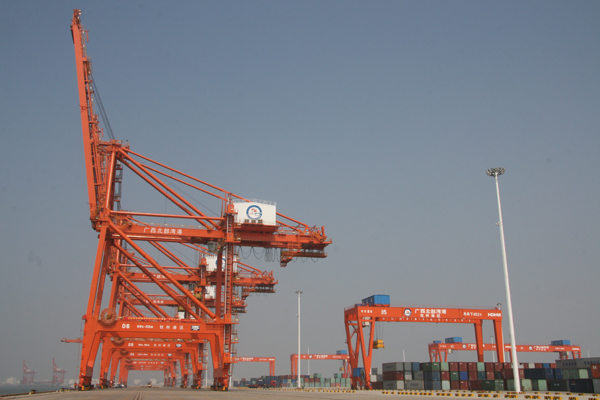Qinzhou booms with free-trade port
|
|
|
Qinzhou Port [China.org.cn] |
Qinzhou, a modern costal city in south China's Guangxi Zhuang Autonomous Region, is booming due to its free-trade port based on industrial cooperation, said Zhang Xiaoqin, secretary of the Municipal Party Committee of Qinzhou.
With a coastline of 86 kilometers, Qinzhou Port is one of the closest Chinese ports to ASEAN countries. Currently, there is one sea channel with a handling capacity of 100,000 tons and 15 10,000-ton-above capacity berths, among which 4 have a capacity of 100,000 tons.
"We are now building a channel with the handling capacity of 300,000 tons, and a number of Beibu Gulf container ports with the capacity of more than 100,000 tons," Zhang said. "By 2012, the port will be able to handle 100 million tons of cargo and more than 1 million TEU (twenty-foot equivalent units) annually."
In addition, more routes will be opened to ports of ASEAN countries. Regular ships have so far been running between Qinzhou, Hong Kong, and Hai Phong, as well as Guangzhou, Shenzhen, Quanzhou and Tianjin. Sea links connecting Qinzhou with Singapore and Malaysia are expected to open in the first half of next year.
Guangxi Qinzhou Free Trade Port Area is the sixth established in China and also the closest to ASEAN countries. Covering a planned total area of 10 square kilometers, it aims at businesses of international transfer, international procurement and distribution, import and export, transit trade, as well as export-oriented processing.
"Enjoying best preferential policies, it will become an international shipping center, a logistic hub and an export-oriented processing base geared toward China-ASEAN regional cooperation," said Xiao Yingzi, mayor of Qingzhou.
According to Wei Peng, deputy director of the Administrative Committee of Qinzhou Port Economic Development Zone, a coastal industrial cluster has taken shape since China's State Council approved the establishment of the Qinzhou Free Trade Port Area in May 2008.
"At present, Qinzhou is working on a modern petrochemical base that will yield an output of 100 billion yuan, and six important industries with 10-billion-yuan output for each, including papermaking, electronics, energy, metallurgy, food and modern logistics," Xiao said.
Companies from ASEAN countries such as SembCorp Group, Eastern Resources and Keppel Group of Singapore, as well as some from Malaysia and Indonesia, have invested in Qinzhou with the hope to strengthen business ties with China through this platform.
According to the statistics provided by Qinzhou Customs, the trade volume between Qinzhou and ASEAN countries reached 260 million US dollars in the first eight months of 2010, with a year-to-year increase of 15.8 percent.
Qinzhou was elected as China's 'City of Charm' at the 7th China-ASEAN Expo this year. Located at the center of Beibu Gulf Economic Zone, it is right on the doorstep to the China-ASEAN Free Trade Area. It will become a new hot spot for China-ASEAN industrial cooperation, Wei said.
 0
0 







